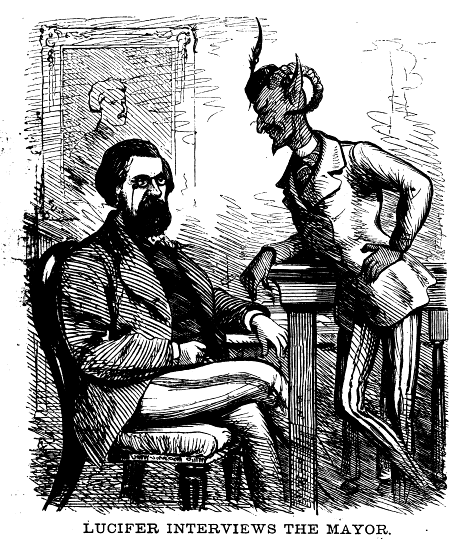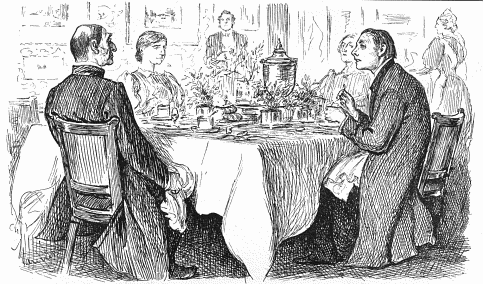|
Punchinello
''Punchinello'' was a short-lived American satirical magazine. Inspired by the English publication ''Punch'', it ran in weekly editions from 2 April 1870 to 24 December 1870. History The magazine was founded by former editors of '' Vanity Fair'', which went out of business in 1863. They found four investors willing to provide $5000 each—though they did not disclose that those four were robber baron Jay Gould, financial buccaneer Jim Fisk, and corrupt politicians Boss Tweed and Peter B. Sweeny. It ceased publication within a year. The magazine's main illustrator was Henry Louis Stephens, who produced a full-page cartoon every week. Other sections included theater reviews, correspondence (real or fictional) from Philadelphia, Boston, and Chicago, and essays on foreign affairs. According to historian of periodicals Frank Luther Mott, "in format as in name, it was an imitator of the London ''Punch''." However Mott stipulated that, unlike its antecedent, "''Punchinello'' was not ... [...More Info...] [...Related Items...] OR: [Wikipedia] [Google] [Baidu] |
Punchinello Mayor Hall
''Punchinello'' was a short-lived American satirical magazine. Inspired by the English publication ''Punch'', it ran in weekly editions from 2 April 1870 to 24 December 1870. History The magazine was founded by former editors of '' Vanity Fair'', which went out of business in 1863. They found four investors willing to provide $5000 each—though they did not disclose that those four were robber baron Jay Gould, financial buccaneer Jim Fisk, and corrupt politicians Boss Tweed and Peter B. Sweeny. It ceased publication within a year. The magazine's main illustrator was Henry Louis Stephens, who produced a full-page cartoon every week. Other sections included theater reviews, correspondence (real or fictional) from Philadelphia, Boston, and Chicago, and essays on foreign affairs. According to historian of periodicals Frank Luther Mott, "in format as in name, it was an imitator of the London ''Punch''." However Mott stipulated that, unlike its antecedent, "''Punchinello'' was ... [...More Info...] [...Related Items...] OR: [Wikipedia] [Google] [Baidu] |
Punch (magazine)
''Punch, or The London Charivari'' was a British weekly magazine of humour and satire established in 1841 by Henry Mayhew and wood-engraver Ebenezer Landells. Historically, it was most influential in the 1840s and 1850s, when it helped to coin the term " cartoon" in its modern sense as a humorous illustration. From 1850, John Tenniel was the chief cartoon artist at the magazine for over 50 years. After the 1940s, when its circulation peaked, it went into a long decline, closing in 1992. It was revived in 1996, but closed again in 2002. History ''Punch'' was founded on 17 July 1841 by Henry Mayhew and wood-engraver Ebenezer Landells, on an initial investment of £25. It was jointly edited by Mayhew and Mark Lemon. It was subtitled ''The London Charivari'' in homage to Charles Philipon's French satirical humour magazine ''Le Charivari''. Reflecting their satiric and humorous intent, the two editors took for their name and masthead the anarchic glove puppet, Mr. Punch, of Punc ... [...More Info...] [...Related Items...] OR: [Wikipedia] [Google] [Baidu] |
Satire
Satire is a genre of the visual, literary, and performing arts, usually in the form of fiction and less frequently non-fiction, in which vices, follies, abuses, and shortcomings are held up to ridicule, often with the intent of shaming or exposing the perceived flaws of individuals, corporations, government, or society itself into improvement. Although satire is usually meant to be humorous, its greater purpose is often constructive social criticism, using wit to draw attention to both particular and wider issues in society. A feature of satire is strong irony or sarcasm —"in satire, irony is militant", according to literary critic Northrop Frye— but parody, burlesque, exaggeration, juxtaposition, comparison, analogy, and double entendre are all frequently used in satirical speech and writing. This "militant" irony or sarcasm often professes to approve of (or at least accept as natural) the very things the satirist wishes to question. Satire is found in many a ... [...More Info...] [...Related Items...] OR: [Wikipedia] [Google] [Baidu] |
Magazine
A magazine is a periodical publication, generally published on a regular schedule (often weekly or monthly), containing a variety of content. They are generally financed by advertising, purchase price, prepaid subscriptions, or by a combination of the three. Definition In the technical sense a ''journal'' has continuous pagination throughout a volume. Thus '' Business Week'', which starts each issue anew with page one, is a magazine, but the '' Journal of Business Communication'', which continues the same sequence of pagination throughout the coterminous year, is a journal. Some professional or trade publications are also peer-reviewed, for example the '' Journal of Accountancy''. Non-peer-reviewed academic or professional publications are generally ''professional magazines''. That a publication calls itself a ''journal'' does not make it a journal in the technical sense; ''The Wall Street Journal'' is actually a newspaper. Etymology The word "magazine" derives from Arabic , ... [...More Info...] [...Related Items...] OR: [Wikipedia] [Google] [Baidu] |
Vanity Fair (magazine, Historical)
''Vanity Fair'' has been the title of at least five magazines, including an 1859–1863 American publication, an unrelated 1868–1914 British publication, an unrelated 1902–1904 New York magazine, and a 1913–1936 American publication edited by Condé Nast, which was revived in 1983. Vanity Fair is notably a fictitious place ruled by Beelzebub in the book ''Pilgrim's Progress'' by John Bunyan. Later use of the name was influenced by the well-known 1847–48 novel of the same name by William Makepeace Thackeray. ''Vanity Fair'' (1859–1863), American The first magazine bearing the name ''Vanity Fair'' appeared in New York as a humorous weekly, from 1859 to 1863. The magazine was financed by Frank J. Thompson, and was edited by William Allen Stephens and Henry Louis Stephens. The magazine's stature may be indicated by its contributors, which included Thomas Bailey Aldrich, William Dean Howells, Fitz-James O'Brien and Charles Farrar Browne. ''Vanity Fair'' (1868–1914), B ... [...More Info...] [...Related Items...] OR: [Wikipedia] [Google] [Baidu] |
Jay Gould
Jason Gould (; May 27, 1836 – December 2, 1892) was an American railroad magnate and financial speculator who is generally identified as one of the robber barons of the Gilded Age. His sharp and often unscrupulous business practices made him one of the wealthiest men of the late nineteenth century. Gould was an unpopular figure during his life and remains controversial. Early life and education Gould was born in Roxbury, New York, to Mary More (1798–1841) and John Burr Gould (1792–1866). His maternal grandfather Alexander T. More was a businessman, and his great-grandfather John More was a Scottish immigrant who founded the town of Moresville, New York. Gould studied at the Hobart Academy in Hobart, New York, paying his way by bookkeeping. As a young boy, he decided that he wanted nothing to do with farming, his father's occupation, so his father dropped him off at a nearby school with fifty cents and a sack of clothes. Early career Gould's school principal was credit ... [...More Info...] [...Related Items...] OR: [Wikipedia] [Google] [Baidu] |
James Fisk (financier)
James Fisk Jr. (April 1, 1835 – January 7, 1872), known variously as "Big Jim", "Diamond Jim", and "Jubilee Jim" – was an American stockbroker and corporate executive who has been referred to as one of the " robber barons" of the Gilded Age. Though Fisk was admired by the working class of New York and the Erie Railroad, he achieved much ill-fame for his role in Black Friday in 1869, where he and his partner Jay Gould befriended the unsuspecting President Ulysses S. Grant in an attempt to use the President's good name in a scheme to corner the gold market in New York City. Several years later Fisk was murdered by a disgruntled business associate. Early life and career Fisk was born in the hamlet of Pownal, Vermont, in Bennington County in 1835. After a brief period in school, he ran away in 1850 and joined Van Amberg's Mammoth Circus & Menagerie. Later, he became a hotel waiter, and finally adopted the business of his father, a peddler. He applied what he learned in the ci ... [...More Info...] [...Related Items...] OR: [Wikipedia] [Google] [Baidu] |
William M
William is a male given name of Germanic origin.Hanks, Hardcastle and Hodges, ''Oxford Dictionary of First Names'', Oxford University Press, 2nd edition, , p. 276. It became very popular in the English language after the Norman conquest of England in 1066,All Things William"Meaning & Origin of the Name"/ref> and remained so throughout the Middle Ages and into the modern era. It is sometimes abbreviated "Wm." Shortened familiar versions in English include Will, Wills, Willy, Willie, Bill, and Billy. A common Irish form is Liam. Scottish diminutives include Wull, Willie or Wullie (as in Oor Wullie or the play ''Douglas''). Female forms are Willa, Willemina, Wilma and Wilhelmina. Etymology William is related to the given name ''Wilhelm'' (cf. Proto-Germanic ᚹᛁᛚᛃᚨᚺᛖᛚᛗᚨᛉ, ''*Wiljahelmaz'' > German ''Wilhelm'' and Old Norse ᚢᛁᛚᛋᛅᚼᛅᛚᛘᛅᛋ, ''Vilhjálmr''). By regular sound changes, the native, inherited English form of the name shoul ... [...More Info...] [...Related Items...] OR: [Wikipedia] [Google] [Baidu] |
Peter B
Peter may refer to: People * List of people named Peter, a list of people and fictional characters with the given name * Peter (given name) ** Saint Peter (died 60s), apostle of Jesus, leader of the early Christian Church * Peter (surname), a surname (including a list of people with the name) Culture * Peter (actor) (born 1952), stage name Shinnosuke Ikehata, Japanese dancer and actor * Peter (album), ''Peter'' (album), a 1993 EP by Canadian band Eric's Trip * Peter (1934 film), ''Peter'' (1934 film), a 1934 film directed by Henry Koster *Peter (2021 film), ''Peter'' (2021 film), Marathi language film * Peter (Fringe episode), "Peter" (''Fringe'' episode), an episode of the television series ''Fringe'' * Peter (novel), ''Peter'' (novel), a 1908 book by Francis Hopkinson Smith * Peter (short story), "Peter" (short story), an 1892 short story by Willa Cather Animals * Peter, the Lord's cat, cat at Lord's Cricket Ground in London * Peter (chief mouser), Chief Mouser between 1929 a ... [...More Info...] [...Related Items...] OR: [Wikipedia] [Google] [Baidu] |
Henry Louis Stephens
Henry Louis Stephens (February 11, 1824 – December 13, 1882) was an American illustrator and editorial cartoonist. Art career Henry Louis Stephens was born in Philadelphia in 1824. Around 1859, he went to New York under an engagement with Frank Leslie. After a year, he transferred his services to Harper & Brothers. Stephens was a prolific artist and accomplished a great amount of work for book and magazine illustration. Publications Stephens was well known as a caricaturist, excelling especially in the humorous delineation of animals, and drew cartoons and sketches for ''The Cyclopedia of Wit and Humor'' (1858), a book edited by William Evans Burton, '' Vanity Fair'' (1859–63), ''Mrs. Grundy'' (1869), ''Punchline'' (1870), and other periodicals. He contributed artwork to Mark Twain's comic memoir, ''Roughing It'' and the novel '' The Gilded Age: A Tale of Today'' by Mark Twain and Charles Dudley Warner. He illustrated some children's books, including ''Aesop's Fables'', '' ... [...More Info...] [...Related Items...] OR: [Wikipedia] [Google] [Baidu] |
Frank Luther Mott
Frank Luther Mott (April 4, 1886 – October 23, 1964) was an American historian and journalist, who won the 1939 Pulitzer Prize for History for Volumes II and III of his series, ''A History of American Magazines''. Early life and education Mott was born in Rose Hill, Iowa. His parents were Mary E. (Tipton) and David Charles Mott, publishers of the weekly ''What Cheer, Iowa Patriot''. The Mott family owned a print shop in Keokuk County. He was a practicing Religious Society of Friends, Quaker. When he was 10 his father began publishing the Audubon, Iowa ''Republican'' and he assisted in the typesetting. He did the first three years of his college education at Simpson College and then completed his bachelor's degree at the University of Chicago. Mott attended Columbia University starting in 1917, earning his M.A. in 1919. Carl Van Doren, mentioned in the Franklin section below, was teaching at Columbia during this time, and the two may have met then. Mott earned his Ph.D. in 1928 f ... [...More Info...] [...Related Items...] OR: [Wikipedia] [Google] [Baidu] |
Cornell University Library
The Cornell University Library is the library system of Cornell University. As of 2014, it holds over 8 million printed volumes and over a million ebooks. More than 90 percent of its current 120,000 Periodical literature, periodical titles are available online. It has 8.5 million microfilms and microfiches, more than of manuscripts, and close to 500,000 other materials, including film, motion pictures, DVDs, sound recording and reproduction, sound recordings, and computer files in its collections, in addition to extensive Digital data, digital resources and the University Archives. It is the sixteenth largest library in North America, ranked by number of book#Collections of books, volumes held. It is also the thirteenth largest research library in the U.S. by both titles and volumes held. Structure The library is administered as an academic division; the University Librarian reports to the university provost (education), provost. The holdings are managed by the Library's subd ... [...More Info...] [...Related Items...] OR: [Wikipedia] [Google] [Baidu] |







_-_MET_DP813069_(cropped).jpg)
